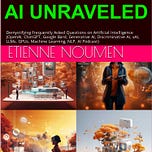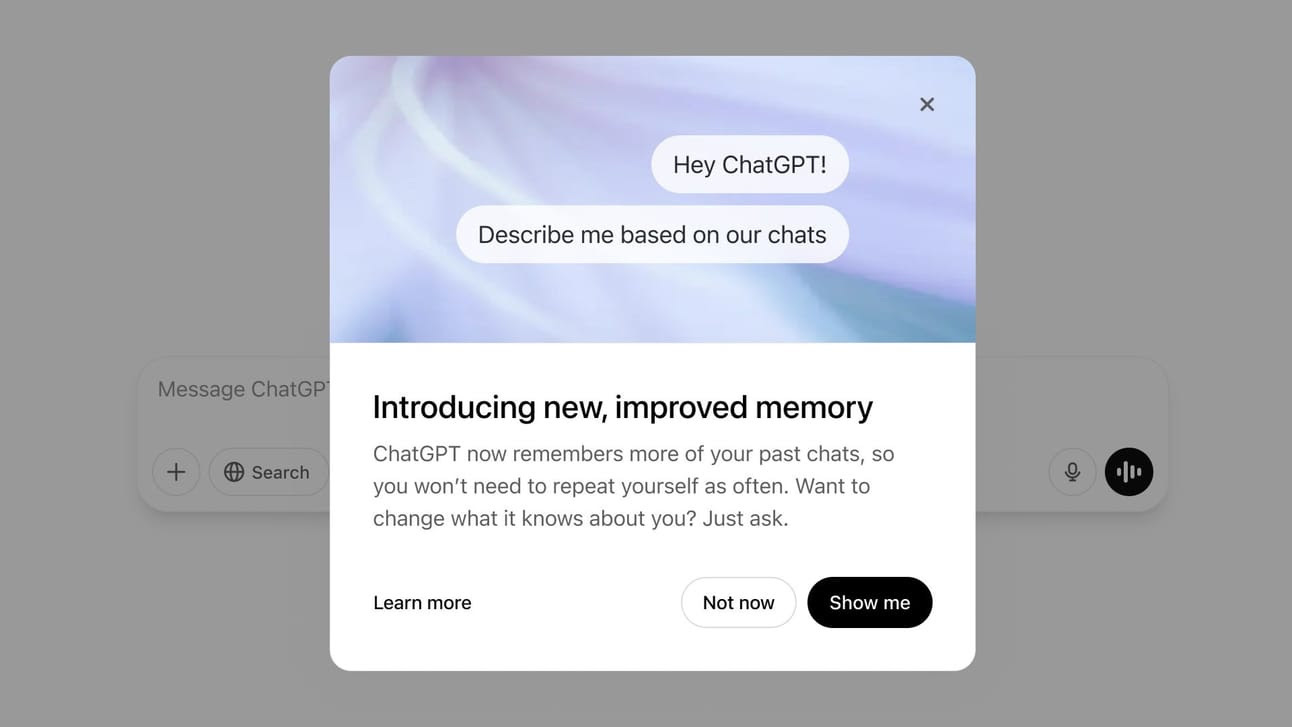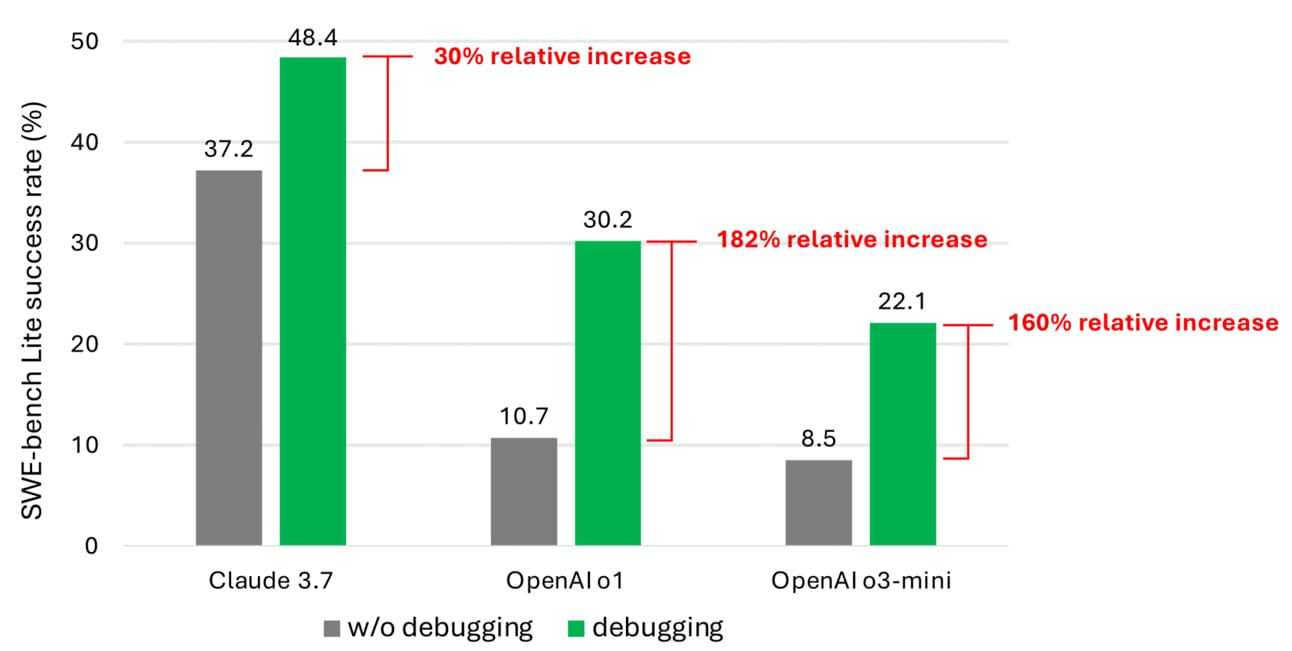A Daily Chronicle of AI Innovations on April 11th 2025
On 11th April 2025, the AI landscape saw significant activity, with OpenAI preparing new, smaller, and reasoning-focused models alongside facing capacity challenges. Elsewhere, an AI shopping app was exposed as human-powered, raising ethical concerns. ChatGPT gained a memory feature for more personalised interactions, though not initially in Europe. Apple's AI development encountered internal hurdles despite renewed investment. Mira Murati aimed for substantial seed funding for her new AI venture. Canva expanded its platform with various AI-driven creative tools. Despite progress, AI showed limitations in software debugging, while researchers held mixed views on its broader societal impact. Energy demands for AI data centres were projected to surge, and MIT researchers developed a data protection method. Google's AI rapidly solved a superbug mystery, demonstrating its scientific potential. Further developments included a partnership for AI chip use, adoption of a data protocol, new AI features from Canva, a lawsuit involving OpenAI, the release of an AI benchmark, a new reasoning model from ByteDance, API access to xAI's model, and the launch of an enterprise AI platform.
🔮 OpenAI Prepares to Launch GPT-4.1
OpenAI is gearing up to release GPT-4.1, an enhanced version of its multimodal GPT-4o model, capable of processing audio, vision, and text in real-time. Alongside GPT-4.1, smaller versions named GPT-4.1 mini and nano are expected to debut soon. The company is also set to introduce the full version of its o3 reasoning model and the o4 mini. However, capacity challenges may delay these launches.
References to new reasoning models o3 and o4 mini were discovered in ChatGPT's web version, indicating these additions are likely to debut next week unless launch plans change.
Recent capacity challenges have caused delays in OpenAI's releases, with CEO Sam Altman noting that customers should expect service disruptions and slowdowns as the company manages overwhelming demand.
What this means: These developments indicate OpenAI's commitment to advancing AI capabilities, offering more versatile and efficient models for various applications. [Listen] [2025/04/11]
🫠 AI Shopping App Revealed to Be Human-Powered
A shopping app marketed as AI-driven was found to rely on human workers in the Philippines to fulfill its services. This revelation raises concerns about transparency and the ethical implications of presenting human labor as artificial intelligence.
The app marketed itself as a universal shopping cart that could automatically complete online purchases, but when the technology couldn't handle most transactions, the company secretly employed a call center to perform the tasks manually.
Saniger now faces one count of securities fraud and one count of wire fraud, each carrying a maximum sentence of 20 years, while the SEC has filed a parallel civil action against him.
What this means: The incident underscores the importance of honesty in AI marketing and the need for clear distinctions between human and machine contributions in technology services. [Listen] [2025/04/11]
🧠 ChatGPT Introduces Memory Feature for Conversations
OpenAI has added a memory feature to ChatGPT, allowing the AI to remember information from past interactions. This enhancement aims to provide more personalized and context-aware responses in ongoing conversations.
The enhanced memory feature builds upon last year's update and will be available first to Pro subscribers, followed by Plus users, but is not launching in European regions with strict AI regulations.
Users concerned about privacy can disable the memory feature through ChatGPT's personalization settings or use temporary chats, similar to functionality Google introduced to Gemini AI earlier this year.
What this means: The memory feature represents a significant step toward more intuitive and user-friendly AI interactions, enabling ChatGPT to build upon previous exchanges for improved assistance. [Listen] [2025/04/11]
🍎 Apple's AI Development Hindered by Chip Budget Dispute
Reports suggest that internal disagreements over chip budget allocations have slowed Apple's progress in AI development. The company is now investing heavily in generative AI, with significant funds directed toward research and development to catch up with competitors.
Internal leadership conflicts emerged between Robby Walker and Sebastien Marineau-Mes over who would lead Siri's new capabilities, with the project ultimately being split between them as testing revealed accuracy issues in nearly a third of requests.
Following delays in the enhanced Siri rollout, software chief Craig Federighi reorganized leadership by transferring responsibility from John Giannandrea to Mike Rockwell, though some executives remain confident Apple has time to perfect its AI offerings.
What this means: Apple's renewed focus and investment in AI signal its intention to become a significant player in the AI space, despite earlier setbacks due to internal budgetary conflicts. [Listen] [2025/04/11]
💰 Mira Murati Aims for Historic $2 Billion Seed Funding
Former OpenAI CTO Mira Murati is seeking to raise over $2 billion for her new AI startup, Thinking Machines Lab. If successful, this would represent one of the largest seed funding rounds in history, reflecting significant investor confidence in Murati's vision and team.
The potential funding would surpass other massive AI seed rounds like Ilya Sutskever's $1 billion for Safe Superintelligence, highlighting the continued investor enthusiasm for artificial intelligence ventures.
Thinking Machines has attracted several OpenAI veterans including John Schulman who co-led ChatGPT development, though specific details about the company's products remain limited beyond making AI "more widely understood, customizable, and generally capable."
What this means: The ambitious funding goal highlights the intense interest and investment in AI startups, particularly those led by experienced figures in the industry. [Listen] [2025/04/11]
🎨 Canva Expands with AI Image Generation and More
Canva has introduced new AI-powered features, including image generation, interactive coding, and spreadsheet functionalities. These additions aim to enhance the platform's versatility and appeal to a broader range of users.
The company introduced Canva Code, a tool that allows users to create interactive mini-apps through prompts, developed in partnership with Anthropic to help designers build more dynamic content beyond static mockups.
Canva is expanding its offerings with AI-powered photo editing tools, a new spreadsheet feature called Canva Sheets with Magic Insights and Magic Charts capabilities, and integrations with platforms like HubSpot and Google Analytics.
What this means: Canva's integration of AI tools signifies a move toward more comprehensive creative solutions, empowering users with advanced capabilities for design and content creation. [Listen] [2025/04/11]
🧠 OpenAI Enhances ChatGPT with Long-Term Memory
OpenAI has upgraded ChatGPT's memory capabilities, enabling the AI to recall information from all past conversations to provide more personalized responses. This feature is currently rolling out to Plus and Pro users, with plans to expand to Team, Enterprise, and Education accounts in the coming weeks. Users can manage or disable this feature through the settings.
ChatGPT will cut across all conversations, listening in all the time and capturing users’ preferences, interests, needs, and even things they don’t like.
With all this information, the assistant will then tailor its responses to each user, engaging in conversations “that feel noticeably more relevant and useful.”
Unlike previous versions where users had to specifically request that information be remembered, the system now does this automatically.
If you want to change what ChatGPT knows about you, simply ask in the chat through a prompt.
What this means: ChatGPT is evolving into a more personalized assistant, capable of remembering user preferences and past interactions to enhance user experience. [Listen] [2025/04/11]
💰 Mira Murati's AI Startup Aims for Record $2 Billion Seed Funding
Former OpenAI CTO Mira Murati is seeking to raise over $2 billion for her new AI venture, Thinking Machines Lab. The startup has attracted significant attention, assembling a team that includes several former OpenAI colleagues. If successful, this would represent one of the largest seed funding rounds in history.
Fresh out of stealth with nearly half of the founding team from OpenAI, Thinking Machines Lab is in talks to raise $2B at a valuation of “at least” $10B.
The value of the round is double what Murati was initially targeting, though details can change as the round is still said to be in progress.
Murati launched the AI startup six months after leaving OpenAI, where she spent nearly seven years working on AI systems, including ChatGPT.
While much remains under the wraps, the direction of Thinking Machines is towards “widely understood, customizable, and generally capable” AI systems.
What this means: The substantial funding target underscores the high investor confidence in Murati's vision and the growing demand for advanced AI solutions. [Listen] [2025/04/11]
📝 Transform YouTube Videos into High-Ranking Blog Posts
New AI tools are enabling content creators to convert YouTube videos into SEO-optimized blog posts efficiently. By transcribing video content and utilizing AI-driven summarization, creators can expand their reach and repurpose content across platforms.
Create a notebook in NotebookLM and add your YouTube video transcript as a source via YouTube link or pasted text.
Prepare your SEO strategy by identifying primary and secondary keywords (e.g., for AI automation: "AI workflow tools," "business process automation").
Craft a detailed prompt including your keywords and desired structure, then generate your content.
Enhance your post with images, links, formatting, and a compelling call-to-action before publishing.
What this means: This approach allows for greater content versatility, helping creators maximize the value of their video content and improve online visibility. [Listen] [2025/04/11]
🐞 Study Reveals AI's Limitations in Software Debugging
Despite advancements, AI models still face challenges in software debugging tasks. Studies indicate that while AI can assist in identifying code issues, it often struggles with complex debugging scenarios, highlighting the need for human oversight in software development processes.
Microsoft used nine LLMs, including Claude 3.7 Sonnet, to power a “single prompt-based agent” tasked with 300 debugging issues from SWE-bench Lite.
In the test, the agent struggled to complete half of the assigned tasks, even when using frontier models that excel at coding as its backbone.
With debugging tools, 3.7 Sonnet performed best, solving 48.4% of issues, followed by OpenAI’s o1 and o3-mini with a 30.2% and 22.1% success rate.
The team found that the performance gap is due to a lack of sequential decision-making data (human debugging traces) in the LLMs’ training corpus.
What this means: Developers should continue to rely on human expertise for intricate debugging tasks, using AI as a supplementary tool rather than a replacement. [Listen] [2025/04/11]
🔍 Will AI Improve Your Life? Here's What 4,000 Researchers Think
A major survey of over 4,000 researchers across the globe has revealed mixed expectations about AI’s societal impact. While many foresee AI revolutionizing healthcare, education, and climate science, others warn of increasing inequality, misinformation, and ethical concerns. The study, published in *Nature*, reflects a nuanced view of AI’s promises and perils.
What this means: The global scientific community remains cautiously optimistic about AI, but calls for better governance and safety frameworks to ensure beneficial outcomes. [Listen] [2025/04/11]
⚡ AI Data Center Energy Demands Projected to Quadruple by 2030
A new report warns that the energy consumption of AI data centers could increase fourfold by 2030, fueled by growing demand for large-scale AI model training and inference. Countries around the world are being urged to plan for infrastructure and environmental consequences.
What this means: The environmental impact of AI is becoming a major consideration, and sustainable AI infrastructure will be critical for long-term scalability. [Listen] [2025/04/11]
🔐 MIT Researchers Develop Method to Protect Sensitive AI Training Data
A team at MIT has created a new privacy-preserving technique that can effectively safeguard sensitive data used to train AI models without sacrificing performance. The method introduces minimal overhead while significantly reducing the risk of data leakage or reverse-engineering.
What this means: This advancement could become a standard in industries like healthcare, finance, and defense, where privacy is paramount in deploying AI solutions. [Listen] [2025/04/11]
🧬 Google's AI 'Co-Scientist' Solves Decade-Long Superbug Mystery in 48 Hours
Scientists at Imperial College London spent ten years investigating how certain superbugs acquire antibiotic resistance. Google's AI tool, known as "Co-Scientist" and built on the Gemini 2.0 system, replicated their findings in just two days. The AI not only confirmed the researchers' unpublished hypothesis but also proposed four additional plausible theories.
The article at https://www.techspot.com/news/106874-ai-accelerates-superbug-solution-completing-two-days-what.html highlights a Google AI CoScientist project featuring a multi-agent system that generates original hypotheses without any gradient-based training. It runs on base LLMs, Gemini 2.0, which engage in back-and-forth arguments. This shows how “test-time compute scaling” without RL can create genuinely creative ideas.
System overview The system starts with base LLMs that are not trained through gradient descent. Instead, multiple agents collaborate, challenge, and refine each other’s ideas. The process hinges on hypothesis creation, critical feedback, and iterative refinement.
Hypothesis Production and Feedback An agent first proposes a set of hypotheses. Another agent then critiques or reviews these hypotheses. The interplay between proposal and critique drives the early phase of exploration and ensures each idea receives scrutiny before moving forward.
Agent Tournaments To filter and refine the pool of ideas, the system conducts tournaments where two hypotheses go head-to-head, and the stronger one prevails. The selection is informed by the critiques and debates previously attached to each hypothesis.
Evolution and Refinement A specialized evolution agent then takes the best hypothesis from a tournament and refines it using the critiques. This updated hypothesis is submitted once more to additional tournaments. The repeated loop of proposing, debating, selecting, and refining systematically sharpens each idea’s quality.
Meta-Review A meta-review agent oversees all outputs, reviews, hypotheses, and debates. It draws on insights from each round of feedback and suggests broader or deeper improvements to guide the next generation of hypotheses.
Future Role of RL Though gradient-based training is absent in the current setup, the authors note that reinforcement learning might be integrated down the line to enhance the system’s capabilities. For now, the focus remains on agents’ ability to critique and refine one another’s ideas during inference.
Power of LLM Judgment A standout aspect of the project is how effectively the language models serve as judges. Their capacity to generate creative theories appears to scale alongside their aptitude for evaluating and critiquing them. This result signals the value of “judgment-based” processes in pushing AI toward more powerful, reliable, and novel outputs.
Conclusion Through discussion, self-reflection, and iterative testing, Google AI CoScientist leverages multi-agent debates to produce innovative hypotheses—without further gradient-based training or RL. It underscores the potential of “test-time compute scaling” to cultivate not only effective but truly novel solutions, especially when LLMs play the role of critics and referees.
What this means: This breakthrough demonstrates AI's potential to accelerate scientific discovery, offering researchers a powerful tool to explore complex biological problems more efficiently. [Listen] [2025/04/11]
What Else Happened in AI on April 11th 2025?
Ilya Sutskever's Safe Superintelligence (SSI) partnered with Google Cloud to use the company's TPU chips to power its research and development efforts.
Google CEO Sundar Pichai confirmed that the company will adopt Anthropic’s open Model Context Protocol to let its models connect to diverse data sources and apps.
Canva introduced Visual Suite 2.0, several AI features, and a voice-enabled AI creative partner that generates editable content at Canva Create 2025.
OpenAI countersued Elon Musk, citing a pattern of harassment and asking a federal judge to stop him from any “further unlawful and unfair action.”
OpenAI also open-sourced BrowseComp, a benchmark that measures the ability of AI agents to locate hard-to-find information on the internet.
TikTok parent ByteDance announced Seed-Thinking-v1.5, a 200B reasoning model—with 20B active parameters—that beats DeepSeek R1.
Elon Musk’s AI startup, xAI, made its flagship Grok-3 model available via API, with pricing starting at $3 and $15 per million input and output tokens.
AI company Writer launched AI HQ, an end-to-end platform for building, activating, and supervising AI agents in the enterprise.
Djamgatech: Free Certification Quiz App
Ace AWS, PMP, CISSP, CPA, CFA & 50+ Exams with AI-Powered Practice Tests!
Why Professionals Choose Djamgatech
100% Free – No ads, no paywalls, forever.
Adaptive AI Technology – Personalizes quizzes to your weak areas.
2024 Exam-Aligned – Covers latest AWS, PMP, CISSP, and Google Cloud syllabi.
Detailed Explanations – Learn why answers are right/wrong with expert insights.
Offline Mode – Study anywhere, anytime.
Top Certifications Supported
Cloud: AWS Certified Solutions Architect, Google Cloud, Azure
Security: CISSP, CEH, CompTIA Security+
Project Management: PMP, CAPM, PRINCE2
Finance: CPA, CFA, FRM
Healthcare: CPC, CCS, NCLEX
Key Features
Smart Progress Tracking – Visual dashboards show your improvement.
Timed Exam Mode – Simulate real test conditions.
Flashcards – Bite-sized review for key concepts.
Community Rankings – Compete with other learners.
Ranked for These Popular Searches:
"best free aws certification app 2024" | "pmp practice test with explanations" | "cissp quiz app offline" | "cpa exam prep free" | "google cloud associate engineer questions"
Trusted by 10,000+ Professionals
"Djamgatech helped me pass AWS SAA in 2 weeks!" –
"Finally, a PMP app that actually explains answers!" –
Download Now & Start Your Journey!
Your next career boost is one click away.
📥 Get Djamgatech (iOs) at Apple App Store: https://apps.apple.com/ca/app/djamgatech-cert-master-ai/id1560083470.
📥 Get Djamgatech (android) at Google Play Store: https://play.google.com/store/apps/details?id=com.cloudeducation.free&hl=en
📥 Get Djamgatech (Windows) at Microsoft App Store: https://apps.microsoft.com/detail/9nnr153jfgw2?hl=en-us&gl=US
Djamgatech is also available on the web at

























Share this post